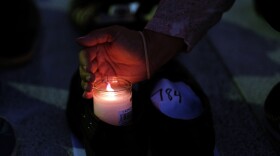
Adrian Florido
Adrian Florido is a national correspondent for NPR covering race and identity in America.
He was previously a reporter for NPR's Code Switch team.
His beat takes him around the country to report on major flashpoints over race and racism, but also on the quieter nuances and complexities of how race is lived and experienced in the United States.
In 2018 he was based in San Juan, Puerto Rico, reporting on the aftermath of Hurricane Maria while on a yearlong special assignment for NPR's National Desk.
Before joining NPR in 2015, he was a reporter at NPR member station KPCC in Los Angeles, covering public health. Before that, he was the U.S.-Mexico border reporter at KPBS in San Diego. He began his career as a staff writer at the Voice of San Diego.
Adrian is a Southern California native. He was news editor of the Chicago Maroon, the student paper at the University of Chicago, where he studied history. He's also an organizer of the Fandango Fronterizo, an annual event during which musicians gather on both sides of the U.S.-Mexico border and play together through the fence that separates the two countries.
-
Andy Slavitt, former senior adviser to President Biden on COVID-19, shares what he thinks the endemic phase of COVID-19 will look like in the U.S. and how we can prepare for that stage now.
-
The singer had been in critical condition recently after being hospitalized due to a fall at his Guadalajara ranch in August, and being diagnosed with Guillain–Barré syndrome afterwards.
-
Educators say Republican bills to restrict teaching on race are forcing teachers to second-guess whether they can lead students in important conversations at a critical time.
-
Puerto Rico's governor updated the island's official death toll from 64 on Tuesday after the long-awaited study, based on access to government mortality data and death certificates, was released.
-
A new survey found that Latinos born in the U.S. tend to see racial or ethnic discrimination differently than Latinos who came to the country.
-
Many of the 600,000 immigrants in Houston without legal status don't qualify for federal assistance and are scared to ask for help.
-
During the Great Depression, up to 2 million Mexicans and Mexican-Americans were expelled from the U.S. Research suggests that more than half were U.S.-born citizens.





